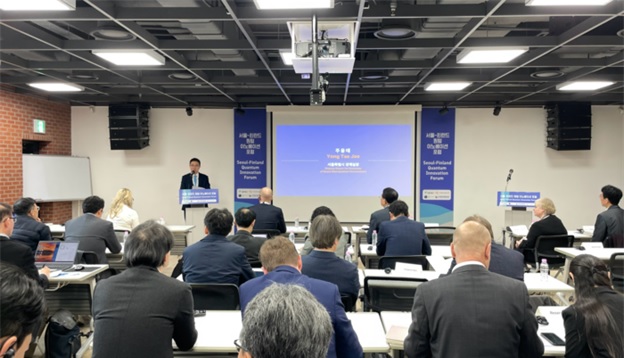The Seoul Metropolitan Government announced that it will establish a dedicated hub for the quantum industry—tentatively named the Quantum Technology Convergence Support Center—as part of its broader initiative to position the city as a leader in next-generation computing. The center will support R&D tailored for local SMEs specializing in quantum technologies while fostering a quantum ecosystem and expanding international cooperation.
The announcement was made during the Quantum Innovation Forum held on May 3 at Seoul Bio Hub in Dongdaemun District, co-hosted by the Embassy of Finland in Korea, the Future Quantum Convergence Forum, and the Korea Institute of Science and Technology (KIST). The event brought together global quantum companies and institutions to explore joint research and business collaboration.
The planned hub will utilize the Hongneung R&D Support Center, with a target opening in the first half of 2027. Facilities will include a quantum packaging lab for developing quantum components, incubation areas for startups, and research spaces for both domestic and international talent.
Seoul will allocate KRW 9 billion (approx. USD 6.5 million) this year to support its “Seoul-style R&D” for quantum industries. The initiative will focus on three pillars: developing new technologies, cultivating professional talent, and strengthening infrastructure to scale up the ecosystem. The city recently passed a Quantum Industry Support Ordinance to systematize its support framework.
The Seoul Quantum Campus, co-organized by KIST and Seoul Metropolitan Government, will be expanded. It plans to train talented people in quantum science and technology and the quantum industries. It also supports technical consulting for excellent tasks of the “Process to Deepen the Commercialization of Quantum Technology”, overseas technical exchanges, and participation in domestic and overseas exhibitions. To promote commercialization through the application of quantum technology, it plans to organize and operate specialized industrial courses and hold a winter vacation quantum camp for college students.
“Quantum technology holds the potential to revolutionize sectors such as medical, cybersecurity, and energy,” said Yong-tae Joo, Head of Seoul Metropolitan Government’s Economic Office. “To respond to the quantum era, the Seoul Metropolitan Government will build an ecosystem of quantum industries based on industrial, academic, and research networks and invest in global networks, corporate support, and fostering key personnel.”
Finland is seeking collaboration with the Korean quantum ecosystem. The Finnish government is working with Korea’s Institute of Information & Communications Technology Planning & Evaluation (IITP) for three years in the public sector quantum initiative. In the private sector, Finnish quantum computing firm IQM recently supplied quantum systems to Chungbuk National University.
The two countries plan to enhance joint efforts through a trilateral network involving governments, academia, and industry, including major players such as Nokia, IQM, Bluefors, and top Finnish universities like Aalto University and the University of Helsinki.
“Finland has a strong research community in superconducting technologies and cryogenics,” said Finnish Ambassador to Korea Jyri Jarviäho. “We recognize the strategic importance of quantum technology, and we are deeply invested in quantum through policy, funding, and infrastructure.”
Twelve Finnish institutions participated in the forum, including Bluefors, the leading quantum cryogenic company, IQM, and Nokia, alongside Korean counterparts such as SDT, Qunova Computing, Trupixel, IDQ, and scholars from the University of Seoul and other institutions.


